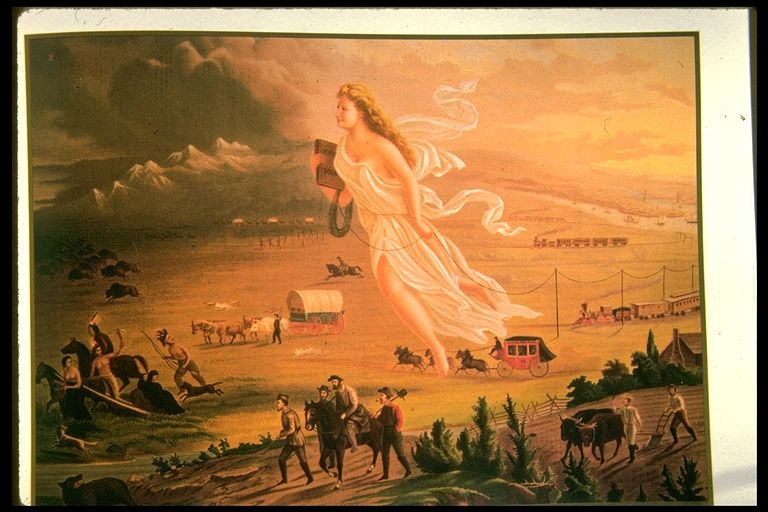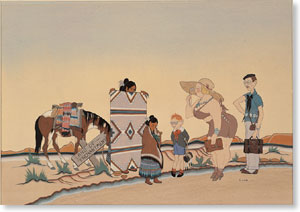Buffalo Bill | Inventing Buffalo Bill Telling tales about the West, Cody enters show business. (8:52)
History 2710
The West and the Life of the Nation

In John Gast's "American Progress," (1872) a diaphanously and precarious clad America floats westward thru the air with the "Star of Empire" on her forehead. She has left the cities of the east behind, and the wide Mississippi, and still her course is westward. In her right hand she carries a school book - testimonial of the national enlightenment, while with her left she trails the slender wires of the telegraph that will bind the nation. Fleeing her approach are Indians, buffalo, wild horses, bears and other game, disappearing into the storm and waves of the Pacific coast. They flee the wonderous vision - the star "is too much for them." - George Crofutt (a contemporary of Gast, who engraved and distributed this painting widely)
In 1893 Frederick Jackson Turner, the "founding father" of Western history, proposed that the westward movement across the continent was the defining national experience, one which left its imprint on both national character and institutions. But Turner's thesis did not embrace the experiences of Native peoples, Mexicans, Asians, and women. Instead, it promoted a triumphal story of progress. Moreover, Turner's analysis abridged the history of the West, concluding in 1890 when the Census Bureau announced there was no longer a distinguishable frontier, thereby denying the West a 20th century history. The thesis proposed by historian Frederick Jackson Turner had 3 major arguments:
A) There has not been one West in American history; there has been a series of Wests. [That is, Turner conceived of the West not as a place, but as a process--a series of Wests in a receding frontier line]. Indeed, Turner wrote, the entire history of America up to the late nineteenth century, has been a history of people setting their eyes westward, marching with their feet westward from the Atlantic seaboard into the western portions of Massachusetts and Pennsylvania, eventually into the Ohio Valley, from the Ohio Valley beyond the Mississippi into the Great Plains and to the Far West. And so American history, Turner observed in this first important generalization, has been the history of a people escaping or leaving behind the settled institutions of society, a plunging into the forests, or later into the grasslands of the Great Plains. "The existence of an area of free land, its continuous recession, and the advance of American settlement westward, explain American development. American social development has been continually beginning over again on the frontier."
B) Definition of "frontier": Turner wrote the frontier is "the outer wave of expansion, the meeting point between savagery and civilization." When people left settled territory, when people went into often unexplored areas, the weight of society bore less heavily upon them. They went into areas where they had no settled established governments, no institutions like churches, courts of law, and the like. People, in a sense, left civilization behind. They had to find new ways of adjusting, new ways of peaceful coexistence at this "meeting point between savage and civilization."
C) The most important effect of the frontier in American history has been the promotion of democracy. The frontier, Turner wrote, has been "productive of individualism." In entering into areas without established social structures, each person was pretty much on a basis of equality with each other person. People had to learn democratic means of social cooperation. Democracy, Turner wrote, therefore, was born of free land, and of free, self-reliant individuals moving out on to that land learning how to get along with one another.
These men invented the myth of the American West:
-
-
Historian Frederick Jackson Turner
-
Writer Owen Wister
-
President Theodore Roosevelt
This 1946 watercolor "Land of Enchantment" by Woody Crumbo (1912-1989) is a wry comment on the confrontations of people in the twentieth century West. Woody Crumbo was born in Lexington, Oklahoma, in 1912. A Creek-Potawatomi Indian, Crumbo specialized in Indian figure and animal paintings. He was also an accomplished silversmith, and was an assistant director of the El Paso Museum in Texas.
However, the "New Western historians" propose that the West should be understood as a region: one already endowed with distinctive Indian and Hispanic cultures. It became a region where racial tensions and discriminations, extractive industries, highly urban settlements and a common dependence on the federal government were at least as important as the traditional elements we associate with a rural and independent West.
The “New Western History” has four basic points:
A) First, the West as a place, not the frontier as a process, should be our focus. “The term ‘frontier’ is nationalistic and often racist (in essence, the area where white people get scarce). The history of European advance across North America is better expressed by invasion, conquest, colonization, exploitation, development, [and] expansion of the world market.”
B) The second point follows: whatever it was that happened, it involved the convergence of diverse people—women as well as men, Indians, Europeans, Latin Americans, Asians, Afro-Americans. . . with each other and with the natural environment. The interaction of all these groups, whether in competition or cooperation, is the important thing. “The West was not where we escaped each other, but where we all met.”
C) Third point: the interaction has continued and is still happening. The “frontier” did not end in 1890, as Turner claimed; another hundred years of rich western history has followed, and it demands historians’ attention.
D) Fourth, the western story is neither one of triumph over adversity, with the resulting ennoblement of the American character, nor a unique and exceptional subjugation of an empty land (for Indians were virtually invisible in the traditional story except as enemies who resisted the inevitable). Rather, it is a great moral ambiguity. “In western American history, heroism and villainy, virtue and vice, and nobility and shoddiness appear in roughly the same proportions as they appear in any other subject of human history. . . . This is only disillusioning to those who have come to depend on illusions.”
Reading:
- Article from U.S. New & World Report, 1990.
- work with the following maps:
Topic #1 Explore "Challenge of the Arid West," by Donald Worster for the National Humanities Center. Respond to some of the questions listed as part of section on leading student discussions.
